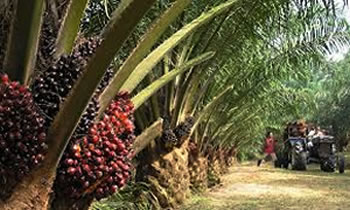Business
Palm oil producers lament threat by imports

- They are killing our business – dealers cry out
By ADEBAYO OBAJEMU
Some palm oil producers and dealers who bared their minds to BusinessHallmark have decried the unrestricted importation of foreign palm oil into the Nigerian market, saying it would cause further harm to the economy. The producers and dealers, who lamented the fall in the price of the commodity, when this reporter visited some markets in Lagos said that Malaysian oil had taken over the market.
Recently the President Buhari announced the policy of government to exclude some food products such as palm oil and milk from access to foreign exchange. Already the Central Bank of Nigeria has begun implementation of the policy which is expected to protect local producers and jobs.
Mrs. Patience Uche, a Lagos-based palm producer, told this BusinessHallmark that this season was when they made good sales from the product but with the influx of the foreign oil the price had crashed.
“A twenty-five litres of oil which used to sell for N19,000 and upward during off-seasons that starts from June to December, now sells for N14,000 and downward.
“The import of this is that the attraction to the farmers, producers and local dealers is being eroded by much cheaper readily available foreign brands,” she said.
According to her, the government should halt the importation in order to retain the job of millions of Nigerians that make a living from the produce.
Mr. John Otunla, a dealer, who trades on the produce from the eastern part to Lagos, said that the trend, if allowed to continue, would spell doom for the economy.
“The soul of business is economies of scale where that is lacking, the business collapses with its attendant woes in loss of jobs and increase in insecurity.
“That is how our rice farmers were sidelined by cheaper foreign brands some years ago making them incapacitated to produce rice to feed the Nigerian population. Thank God the Federal Government is trying to solve that now.
“Many of us borrow money from banks with high-interest rate to buy off oil from producers during the season. We store for months in anticipation of selling with good price during this period of offseason but to no avail,” he said.
He said that the abysmal fall in price would push so many of them out of business, while the foreign brands that were contributing nothing to the economy would be having “a field day’’ in Nigeria market. He said that prompt action had to be taken to stop the economic sabotage from escalating.
Beatrice Ossai, a palm oil seller at the Lagos Iyana Oba Market, said the Nigeria oil is better than the foreign ones because it is devoid of chemicals. This view was reechoed by Folusho Anjorin, an Okitipupa-based Palm oil dealer who comes to Mile 12 in Ketu, Lagos every fortnight to sell his product.
“Honestly, I don’t want to talk about this country, we have low level of protectionism, the Malaysians have destroyed our business, and government is not doing enough to protect us.”
Despite increase in local palm oil production, Nigeria’s import from global top producer – Malaysia – rose by 57 percent in first quarter 2019, data from Malaysian Palm oil Council (MPOC) shows. On a year-on-year basis, Nigeria’s crude palm oil (CPO) import from Malaysia increased to 112,480 metric tons (MT) in the first three months of this year from 47,974MT in the corresponding period in 2018.
Experts say the country’s crude palm oil is less competitive to the imported ones owing to the high cost of production, infrastructural gaps, and high logistic cost among others. According to them, this makes local manufacturers who use CPO as raw materials for production resort to importing the product rather than patronising local producers.
This is evident in the first quarter financial statement of Okomu Oil– Nigeria’s second-largest palm oil producer. The company reported its weakest first-quarter performance since 2014. The poor performance was due to weaker palm oil prices and consumer demand as well as surge in lower priced CPO into the country.
Okomu’s first-quarter financial statement shows that revenue declined by 42.5 percent to N4.2 billion in Q1 2019 from N7.3 billion in same period in 2018. Similarly, profit after tax declined sharply by 71 percent to N1 billion in q1 2019 from N3.5 billion in Q1 2018.
Presco, Nigeria’s largest palm oil producer is yet to release its first-quarter financial statement for the year.
“Nigeria has significantly increased its production in the last 10 years but is still importing a lot of CPO into the country and much more is smuggled through the land borders,” Fatai Afolabi, executive secretary, Plantation Owners Forum of Nigeria (POFON), said in a statement.
Since losing its position as one of the world’s largest palm oil producers, Nigeria is yet to recover and take its proper place in the comity of crude palm oil producing nations owing to the discovery of oil, which changed the country’s palm oil narrative of the 60s.
As a result, Indonesia and Malaysia have surpassed Nigeria’s production, becoming the global leaders in oil palm production.
Adebayo Ojudu, a member of National Palm Produce Association of Nigeria (NPPAN), informed this newspaper that the inability of government to provide a reliable data for the industry has remained a major problem for the industry, saying that some foreign investors are taking advantage of that to deceive the government in allowing the importation of the produce into the country.
Some experts attribute the increase in imports to the high population growth rate in the country that is fuelling demand.
Nigeria’s population is rising rapidly but food production is not moving in same trajectory, causing gaps in major crop production including palm oil.








